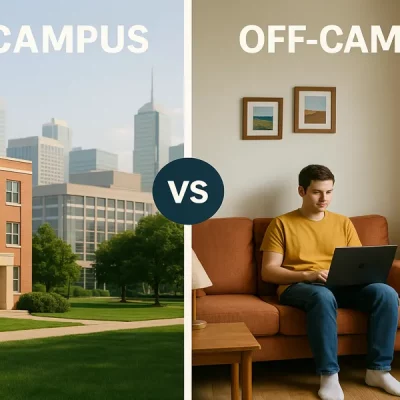How to Avoid These 7 Common Housing Mistakes?
Table of Contents
Looking for student accommodation can feel like navigating a maze – one wrong turn, and you could end up with a flat that’s too far from campus or an unexpected surprise on your first rent payment. We’ve all heard housing crises: a friend who signed a lease without reading the fine print or someone who moved into a place that turned out to be a noisy nightmare. But it doesn’t have to be this way! In this blog, we’ll walk you through the 7 most common housing mistakes students make and how to avoid them, ensuring your study abroad experience is off to a smooth start.
How to Avoid Common Student Housing Mistakes?
Booking student housing is one of the biggest – and most complex – financial decisions you’ll ever make. It’s easy to get swept up in the excitement, but rushing into it without a solid plan can lead to costly mistakes. Here are the 7 common housing mistakes you must avoid.
1. Lack of Financial Preparation
Many students underestimate the full cost of renting or living independently, often failing to budget properly for rent, utilities, and other hidden costs. This lack of financial preparation can lead to stress and unexpected financial difficulties.
How to Avoid?
Students should create a detailed budget, including not only rent but also utilities, transportation, food, and emergency expenses. Consider using budgeting apps or spreadsheets to track monthly spending. It’s essential to ensure that monthly rent is affordable based on your income or allowance. A financial cushion or emergency fund can also help avoid unexpected financial strain.
2. Not Reading the Lease Agreement Carefully
It’s tempting to sign a lease quickly, especially when you’re eager to secure a place. However, neglecting to read the lease carefully can result in unpleasant surprises, such as hidden fees, unclear rental terms, or an unfair return on your deposit.
How to Avoid?
Always read the lease thoroughly before signing, paying particular attention to rent due dates, maintenance responsibilities, security deposits, and penalties for breaking the lease. If you don’t fully understand any clauses, seek clarification from the landlord or a legal advisor. Having a second pair of eyes to review the document can be beneficial.
3. Overlooking Inventory Checks
Failing to check the condition of the property before moving in can lead to disputes over security deposit returns. Some students may overlook existing damages or missing items that should have been documented.
How to Avoid?
Conduct a detailed inventory check when moving in and document the condition of the property. Take photos of any damages or discrepancies (e.g., broken furniture, marks on walls). Make sure the landlord or property manager signs off on this inventory. This will protect you from being held liable for damages you didn’t cause.
4. Skipping Home Inspection
Have you heard of the idiom, “haste makes waste?” It means rushing through a task can lead to mistakes, poor results, or extra work. The same happens with students who rush to secure accommodation and skip an essential step: the home inspection. This can lead to moving into a property with hidden issues, such as plumbing problems, electrical faults, or inadequate heating.
How to Avoid?
Always request a home inspection before finalizing your decision. If possible, hire a professional to inspect the property, especially for potential issues that could affect your living conditions. Alternatively, ask the landlord to conduct and provide a recent inspection report. Addressing these issues before you sign can save money and stress later on.
5. Underestimating Additional Costs
Sometimes the entire focus is on property rent and this results in overlooking additional expenses like utilities, internet, council tax, and maintenance costs. These additional costs can accumulate quickly, pushing the total monthly expenses beyond what was originally budgeted.
How to Avoid?
Always ask for a breakdown of all costs associated with the property, including utilities, internet, and maintenance fees. Some leases include utilities in the rent, while others do not, so clarifying this is essential. A good rule of thumb is to set aside an additional 30-40% of your rent budget for these extra costs to avoid financial surprises.
6. Not Seeking Professional Guidance
Renting accommodation is complex, and students often make the mistake of going through the process alone, not consulting professionals like real estate agents or legal advisors. This can lead to missed opportunities, poor choices, or even legal issues.
How to Avoid?
While you may feel confident navigating the housing process on your own, it’s always a good idea to seek professional advice, especially when it comes to legal matters or understanding your rights as a tenant. A real estate agent can help you find suitable housing within your budget, while a lawyer can ensure that your lease agreement is fair and lawful.
7. Overpacking or Underpacking
Students often make the mistake of overpacking or underpacking when moving into their new accommodation. Overpacking can lead to clutter, while underpacking may result in missing essential items that are difficult to obtain in a new city.
How to Avoid?
Create a list of essential items before you start packing, and stick to it. Prioritize functional items like bedding, kitchen essentials, and school supplies. Avoid bringing unnecessary items that will take up valuable space. If you’re moving internationally or to a different city, consider shipping larger items ahead or purchasing things locally once you arrive. Efficient packing ensures that your living space remains comfortable without becoming overcrowded.
Conclusion
This was all about the common housing mistakes students make. However, you can learn from others’ mistakes and prepare yourself in advance to make better decisions. On this page, we covered the 7 common mistakes students make and their solutions. Remember, not to rush in and always seek professional guidance when looking for student accommodation abroad.
Frequently Asked Questions
What are some common housing mistakes?
Common housing mistakes include failing to read the lease agreement carefully, overlooking additional costs like utilities, not conducting proper research on the neighborhood, neglecting to inspect the property, and not budgeting for emergencies or repairs.
Is it important to inspect the property before moving in?
Yes, it is crucial to inspect the property before moving in. This helps identify any damage, maintenance issues, or potential hazards that might be overlooked in photos, ensuring that you are fully aware of the property's condition.
Can I take a virtual tour before buying a property?
Yes, many real estate agents offer virtual tours for potential buyers, allowing you to explore the property remotely. Virtual tours provide a convenient way to assess a property, especially if you’re unable to visit in person.
How to check whether a property is genuine or not?
To check if a property is genuine, verify its details with official listings, check for any red flags like unrealistic pricing, look for reviews of the property or landlord, and confirm ownership through public records or legal documents.
What are the causes of housing problems?
Housing problems can stem from a variety of causes, including high demand vs. limited supply, economic factors, rising property prices, poor housing quality, lack of affordable options, and insufficient urban planning or zoning laws.
What is the most common type of housing?
The most common type of housing varies by region but typically includes apartments, single-family homes, and townhouses. In urban areas, apartments are often more common due to higher population densities and limited space.







